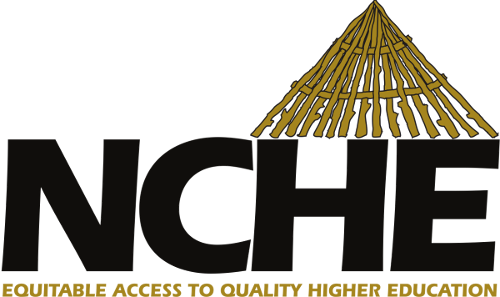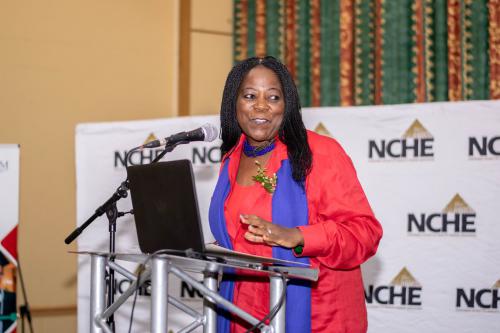Keynote address of Hon. Dr Itah Kandjii-Murangi, Minister of Higher Education, Training and Innovation, Delivered by Hon. Dr Becky Ndjoze-Ojo, Deputy Minister of HETI at The Launch of the 2019 National Graduate Survey, 27 February 2019, Nampower Convention Centre, Windhoek.
Director of Ceremonies; Dr Romanus Kawana
Honourable Obeth Kandjoze, Minister of Economic Planning and Director General of the National Planning Commission
Honourable Erkki Nghimtina, Minister of Labour, Industrial Relations and Employment Creation
Members of the Diplomatic Corp
Honourable Deputy Minister, Dr Becky Ndjoze-Ojo
Chairperson of NCHE, Prof Haoses
Members of the Council present
Vice Chancellors of our Three Universities
Representatives of the Private Higher Education Institutions
Representatives of Professional Bodies
Representatives of Government Offices, Ministries and Agencies
Representatives of Public Enterprises
Employers' Representatives
The Unions (NANTU, NAPWU, TUN)
Student Representatives
Members of the Media
Distinguished invited guests
Ladies and Gentlemen
Good morning!
Today is yet another milestone achieved for the Higher Education Sector, where we are launching the 2017 National Graduate Survey results, as well as informing the public about the commencement of the 2019 National Graduate Survey.
We have just listened to the presentations on why graduate surveys are important to higher education, and why we need feedback from graduates as well as why are we interested in the profiles of graduates, sometime after they have left university.
As an active member in the international arena, Namibia subscribes to protocols on higher education emanating from the United Nations; the African Union and the Southern African Development Community.
Examples of such instruments include:
- The United Nations Sustainable Development Goal, and in particular the fourth goal that seeks to "Ensure inclusive and equitable quality education and promote lifelong learning opportunities for all".
- The African Union Agenda 2063, that is the First Ten-Year Implementation Plan the Continental Education Strategy for Africa 2016 to 2025, and this includes the commitment to a Pan-African Quality Assurance and Accreditation Framework, to support educational quality standards across the continent.
- The SADC Protocol on Education and Training, which guides the harmonisation and implementation of regional policies and programme to ensure access to relevant, quality education and training in the SADC region.
Evidently, the common thread that runs through these international guidelines or instruments is the provision of quality higher education. But, how do we ensure that the education we provide is of the desired quality, and quality for what purpose?
In Namibia, we have put in place a number of national policies and strategies to guide sectors in programme development. Allow me to highlight few of these instruments:
- The Namibia's Vision 2030 that envisions a fully integrated, unified and flexible education and training system that prepares Namibian learners to take advantage of a rapidly changing environment, and contribute to the economic, moral, cultural and social development of citizens throughout their lives;
- The SWAPO Party Manifesto with its vision for human capital that expects Namibia to have a high quality and internationally recognised education system that will help Namibians to meet current and future demands for skills and innovation; and
- The National Human Resources Plan that serves as the instrument for directly addressing unemployment and skills shortages, and calls for the education sector to tailor the labour market demand to human resources supply and improve the quality of training outcomes.
Ladies and Gentlemen,
In the higher education sector, quality is assured through efficiency measures, such as testing efficiency of the education institutions by examining what happened to their graduates. This is the purpose of conducting graduate surveys!
The result of this survey provide valuable insights for higher education policy makers, human resources planners, and researchers. Career advisors too ought to integrate these findings into their career counselling practices, which in turn assist prospective students to make informed choices of course and careers.
Director of Ceremonies
Let me now turn to the Report that brought us here today.
While graduate surveys cannot directly measure outcomes or competencies, they can be seen as a proxy for outcome measures of higher education. To illustrate this point, the unemployment rate of the graduates was found to be between 17-19 per cent by both the 2016 Labour Force Survey and by the 2017 Graduate Survey. During that period, the number of graduates who completed studies as reported in the 2016 Namibia Higher Education Statistical Yearbook was around 10,000 per year. This means approximately 2,000 of our new graduates might have been unemployed, not to talk about the cumulative effect over the years. This situation is worrisome and could be worse considering the economic effects of the past two years. It is therefore important that education institutions empower themselves with resources (both human and material) for sustainable review of programmes to be responsive to the needs of the industry, now and in the future.
We have just listened to the highlights of the 2017 survey report, which tells us that majority of the graduates (close to 70 per cent) rated the course/ programme content “high” in terms of the usefulness to their current employment. On the other hand, it is a cause of concern though that close to half of the graduates expressed dissatisfaction with study conditions at the universiteis, especially in the view that the Government is already spending over 5 per cent of its total expenditure on higher education, which is recorded as one of the highest in the world. We are also told that 83 per cent of graduates were employed but out of those only 2 per cent were self-employed. Even more striking, is the fact that of the graduates who were employed, 73 per cent were employed in the public sector.
Yes, we know that these are trying times when the economic conditions are not in favour of prosperous business, but the private sector should also come to the table and provide employment opportunities for our citizens.
I am however encouraged and indeed gratified to observe that at least out of the 17 per cent who are unemployed, a third of those where pursuing further studies. Postgraduate studies are crucial ingredients to fast-tracking industrial development.
Director of Ceremonies,
The results I cited are at a national level, therefore I call on institutions to dig deeper and understand the implications at the institutional, faculty and departmental levels. Your observations and interpretations shall inform long-term planning. As a matter of fact, the implementation of the National Human Resources Plan is high on the Government agenda. It is no secret that the poor linkages between the country’s capacity needs, enrolments in higher education, and the industry, have adverse effect on the identification of priority areas. After the assessment of the higher education, training and innovation sub-sector, my Ministry is now seized with the formulation of the National Human Resources Development Strategy. In few months to come, we will be facilitating national consultations on the formulation of this Strategy. With such a Strategy, we will be able to easily monitor the output and relevance of our tertiary education.
Director of Ceremonies,
This now brings me to the next issue on our agenda, which is the commencement of the 2019 Graduate Survey. This Survey focuses on the graduates who completed their studies in 2014, 2015 and 2016 at the three Universities, namely UNAM, NUST and IUM. The survey period starts from today, the 27th of February 2019 until 31 May 2019.
The NCHE and the three Universities have been hard at work, laying the ground for the 2019 National Graduate Survey. Background activities to this process include sensitising the graduates about the study and verifying their contact details. The online questionnaire has been set up on the universities' websites to collect the information.
I am glad to note that the NCHE has made the conducting of graduate surveys a permanent project in their Strategic Plan. As you can see, the focus for now is on the universities. The plan is to build capacity of these institutions so that they in turn can assist others. As I have mentioned earlier, surveys are functions of quality assurance: so when all is said and done, graduate survey reports would become a compulsory requirement when institutions apply for external quality assurance.
Director of Ceremonies, Ladies and Gentlemen,
At this juncture, I would like to call upon all the graduates who completed their studies at NUST, UNAM and IUM in 2014, 2015 and 2016 to take time off their schedules and respond to the survey. Today, 27 February 2019, marks the official commencement of the study, thus the online survey links are already open to participate. Information about the study can be found in the media; at public places noticeboards as well as at the universities‘ alumni offices, regional campuses, websites.
Vice-Chancellors please ensure that a senior official is overseeing those activities in your institutions. There should be regular feedback to top management so as to promote ownership and sustainable management.
Distinguished Guests, Ladies and Gentlemen,
Allow me to quote Peter Drucker, the man believed to have invented modern business management who once said: "If you cannot measure it, you cannot improve it". The report and the project I am about to launch constitute measures of the external efficiency of our higher education.
It is now my pleasure to officially adopt the 2017 Namibia Graduate Survey Report. I also have the honour to declare the 2019 National Graduate Survey officially launched.
I thank you!


